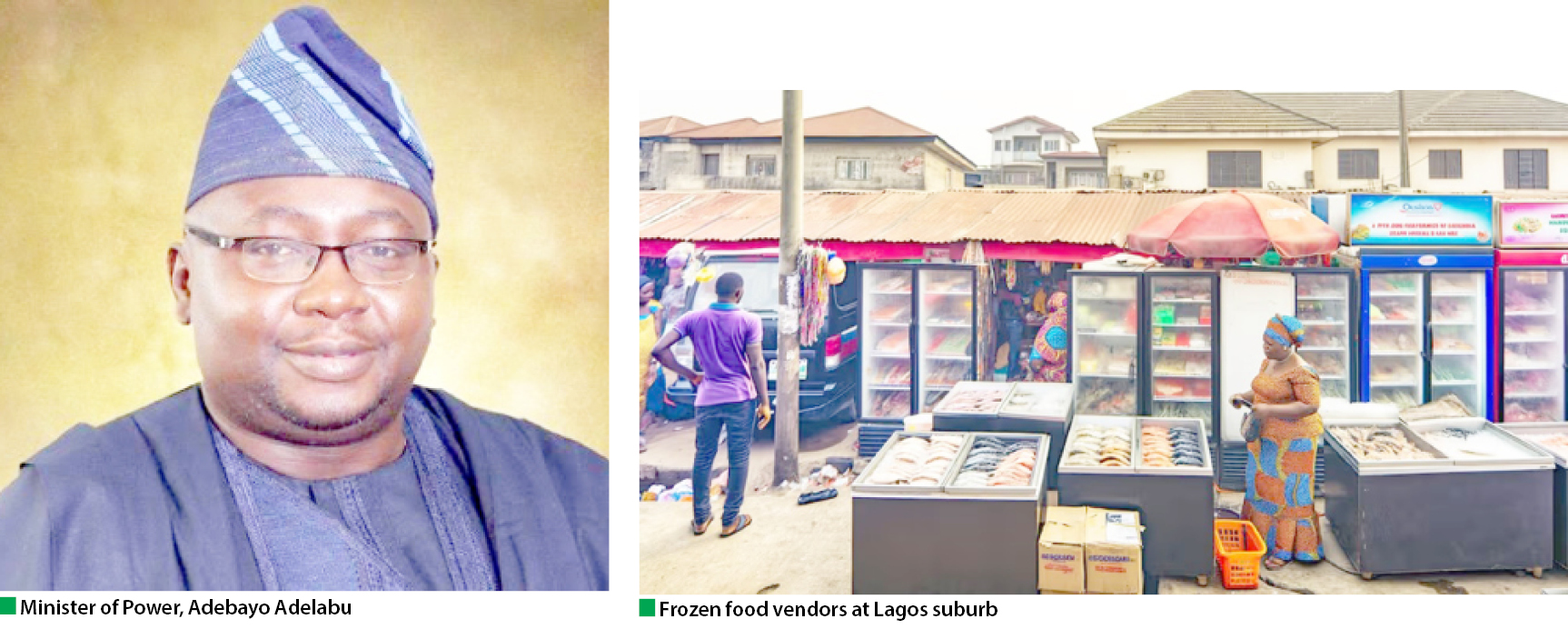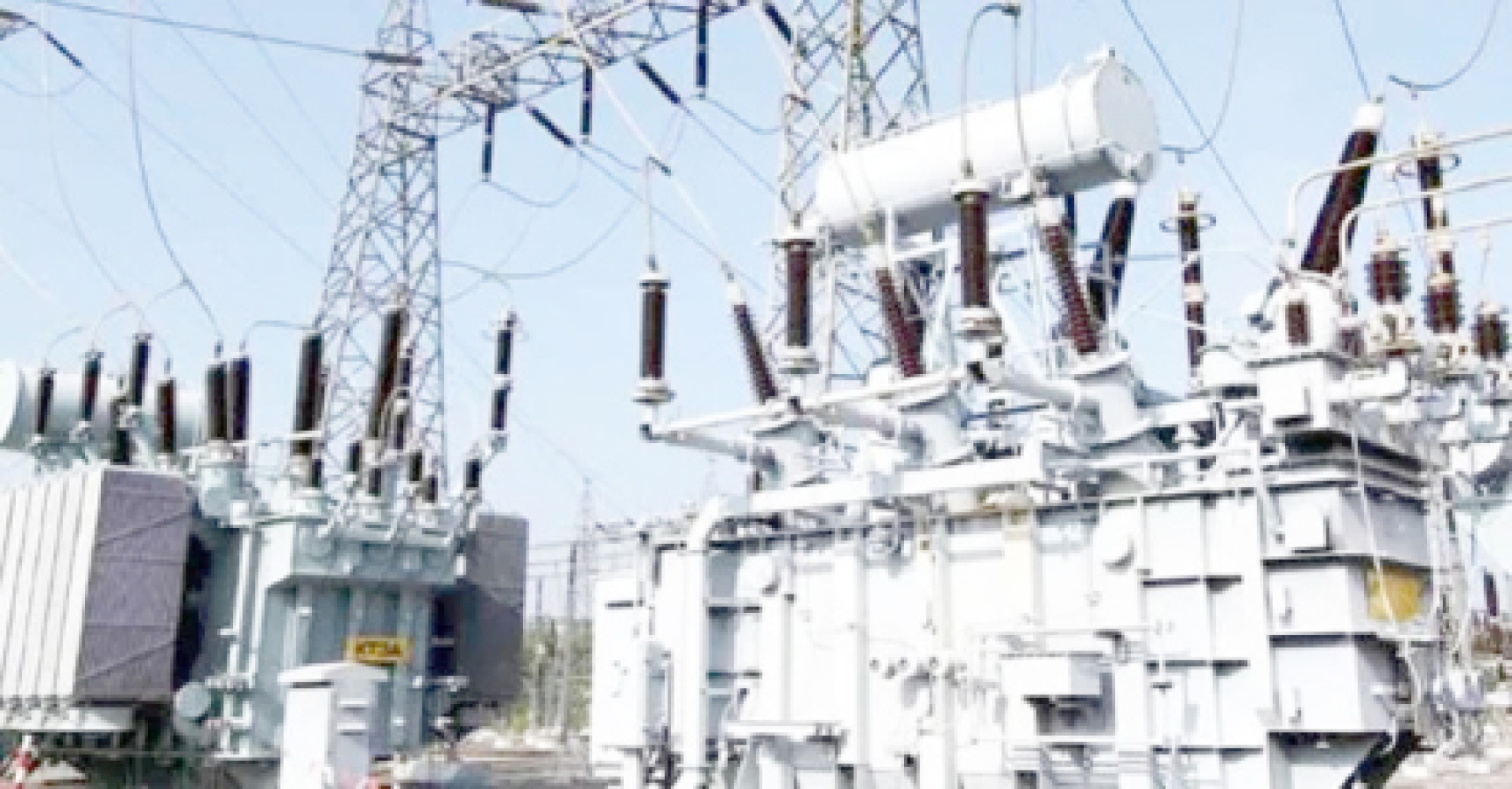Nigerians are lamenting the consequences of epileptic power supply that has characterized the Nigeria Electricity Supply Industry (NESI) in recent times.
Nigeria’s electricity generation, which was around 4,000 Megawatt (MW) in the past 10 years, has further plunged to 3,500 MW lately.
The drop in generation was attributed to the inability of the electricity generation companies to pay for gas suppliers that feed their plants, according to people with knowledge of happenings in the industry.
The Minister of Power, Adebayo Adelabu, had said that gas companies are being owed over N3 trillion, with the government having N1.3 trillion debt yet to be redeemed.
- War on Gaza: Air strike kills 36 relatives preparing for fasting
- Cable cuts: African leaders tasked on infrastructure security
Similarly, the lack of rainfall because of the dry season has reduced the flow of water to hydro power plants that contribute 27 per cent of electricity to Nigeria’s energy mix.
Business owners grumble
With the price of alternative energy from fossil fuel rising by more than 100 per cent due to removal of subsidy, small business owners who spoke Daily Trust on Sunday said the continued poor power supply from the national grid is having huge negative effects on their businesses.
This is just as they said they have stopped buying large quantities of perishable goods due to poor electricity to sustain their ventures.
The most affected include barbers, hairdressing salons, welders, printers, computer operators, dry cleaners, cold soft drink vendors, grinding machine operators, restaurateurs, tailor, who use industrial sewing machines, among others.
In Minna, the capital of Niger State, fresh tomato and pepper sellers have attributed low patronage to the power crisis as customers are finding it difficult to preserve the commodities in their refrigerators.
The Chairman, Fresh Tomato, Pepper, Onion and Vegetable Sellers Association, Alhaji Bala Kura, said the patronage in the past month has dwindled, calling on the government to intervene.
A Minna based printer and publisher, James Adelowo, said the epileptic power supply situation has been frustrating.
He said engaging in small business is no longer profitable.
“It is frustrating and really killing. Every profit we make goes back to fuelling the generator. Most of the time, we can’t even afford the fuel, so businesses are really going through a very tough time now,” he said.

Another printer, Sunday Samuel, disclosed that: “Some days, I don’t do anything because if I buy N5,000 fuel, it doesn’t take me anywhere. Before you know, it is finished.”
Anothet resident, Mrs Amina Sadeeq, said she often purchases tomatoes and meat in large quantities and stores some in her refrigerator but the poor power situation has forced her to stop.
“We now buy what we can use for the day because there is no light to store them. In my area, Gbeganu, we have less than an hour of power supply daily, so, how do you store fresh meat, tomatoes and pepper? Recently, I had to throw away large quantities of tomato and pepper that got spoiled,” she said.
Aisha Mohammed Kudu, a housewife, told Daily Trust on Sunday that, “The heat is much and the weather is not friendly at all. The electricity situation is not helping matters. One can’t sleep comfortably in this heat at night and the generator is a no-go area. So, we use local fans”.
The situation is the same in Ilọrin, the Kwara State capital, where Hajia Fatimah Alasela, a frozen fish seller, closed her business due to lack of electricity supply.
“We have folded up the business for now. The beauty of the business is regular power supply, but sometimes for three days we won’t have light and when available, it lasts for one hour. At the end of the day, the fish will get spoiled and all the investment will vanish. So, we have to suspend the business until the power situation improves”, she said.
She added that attempting the use of diesel, which goes for over N1,600 for a litre, as an alternative, would increase the price of the fish which is already high.
“I even tried to smoke the fish first to reduce the amount of electricity we would need to preserve it, but it didn’t work out. There are two issues we need to get out of this situation: regular power supply and a reduction in the price of fish, which is increasing astronomically every day,” she explained.
“From a carton or more, I resolve to buy 1/8 which is the smallest you can buy. Now, just one Shawa is N800 and a kilo of Titus goes for N4,600, which is just two maximum,” she said.
For Mrs Oladuni Abdullahi, a civil servant, the current power situation calls for urgency before it becomes too late.
She reiterated that she cannot stock the house with perishable goods to avoid frequent visits to the market.
“There is no electricity, which is a huge disadvantage considering the way prices of foods and goods are increasing daily,” she said.
While begging the federal government to intervene in solving the power crises in the country, she said she purchased a solar fan at the cost of N45,000, but was sufficient enough for her family as they live in a three-bedroom flat.
“The next time we tried to get another one, the price went up to N110,000 and we had to leave it,” she said.
For small business owners in Makurdi, the Benue State capital, it was the same tales and woe.
A tailor in Makurdi, Hassan Jato, said for the past three months, he was unable to deliver finished clothes for his clients due to inconsistency of power supply.
“As the poor power supply persists, my earnings too have become so lean. I don’t know exactly what has gone wrong with the electricity but the government needs to come to our aid, especially as we can’t run this business on fuel,” Jato said.
Blessing Jeremiah, another resident of Makurdi, said life is tough and called on political leaders to fear God and fix electricity supply.
For those in Lokoja, the Kogi State capital, operating their businesses at a loss has become the order of the day, leading many to close their shops.
A restaurant director in Lokoja, Comfort Bode, said she was forced to reduce the quantity of food she cooks because it is difficult to preserve some condiments for further processing.
“We can no longer enjoy storing fish, grinded tomatoes, pepper and meat in the fridge because of frequent power outages. To make it worse, patronage has dropped because of the lean purchasing power of customers. To worsen it all, every month, the electricity (distribution) company will bring outrageous bills to us, making it difficult for us to operate effectively,” she said.
A hair dressing salon operator in Ganaja area of Lokoja, Mrs Abigail Jonathan, also complained of losing customers because of incessant power outages in the vicinity, and her inability to buy fuel for generators to keep the business running.
Despite Plateau State having two sources of electricity supply from the Jos Disco and NESCO, a private power supply located in Barkin Ladi, near Jos, the state capital, residents expressed their displeasure at the unsteady power supply.
A welder, Dominic Eric, said, “Within the last one month, I hardly see the power to work for two hours. I end up sleeping in the shop waiting for the power to come. At times, the light comes by 1:30am, and before completing a work, the light goes off. The high cost of a litre of petrol is not an option for my welding work.”
Keneng Luka, who owns Fine Look Salon in Tudunwada, also said, “The last two weeks have been horrible for my kind of business.
“I have reduced my work to pedicure, which does not fetch me substantial income. They restore power in the night when I am sleeping at home. By 6am, they would take the light,” she said.
Restaurant owners in the city are also counting their losses as Marylin Pam told our correspondent that she cannot preserve her foods anymore.
A resident of Rantya, Jos South Local Government Area, Mrs Tongnaan Bawa, had a more terrible experience.
“Our transformer packed up since the last two weeks. Jos Disco officials came and picked it up for repairs and have not returned it till this moment. We are in a heat period and only God knows what we are passing through. I can’t keep any food anymore in my deep freezer. The entire community is not happy, you can’t iron your dresses, you can’t relax in your room, you can’t even sleep,” she lamented.
In Nasarawa State, residents of Lafia appealed to authorities concerned to look into the power supply across the 13 local government areas of the state and Nigeria as a whole.
Some of them have even asked President Ahmed Bola Tinubu to call the AEDC to order and ensure that every Nigerian gets light as expected.
A resident of Tudun Gwandara community in Lafia, Danladi Abdullahi, said that if nothing was urgently done to improve electricity supply in the entire country, Nigerians would have no other alternative than to come out en masse for a peaceful protests.
Abdullahi further said that despite issues of insecurity, including banditry and kidnapping continuing unabated in most communities, the persistent blackout has heightened the sufferings of the people.
“After the inauguration of the Akurba 330KVA project in February 2022 by former President Muhammadu Buhari, we thought that the issue of blackout has ended. But surprisingly, the AEDC only increased its bills and stopped supplying adequate electricity. The situation became worse compared to how it was when we did not have the Akurba 330KVA substation in Lafia.
“The AEDC had sometime last year migrated us to tariff band A from tariff BAND D, which made monthly bills jump by almost 100 per cent without commensurate supply of the electricity in the state.
“We were informed at that time that any consumer on Band A is supposed to enjoy electricity for 20 hours and above in a day, but that is not happening in Nasarawa State,” he said.
Meanwhile, a resident of Bukan-sidi community in Lafia, the state capital, Mrs Mary Abalaku, explained that in the past six months, she had experienced a serious decline in her business because of the poor electricity supply to the area.
Reacting to the situation, the Regional Manager of AEDC, Engr. Baro Ahmad, said that the country was presently generating only about 4,000 megawatts of power, and that this was the reason for the epileptic power supply across Lafia and other parts of the country.
Ahmad, who described the 4,000 megawatts as grossly inadequate, posited that Lafia, which used to get 20 megawatts daily now gets only 7 megawatts of electricity.
“We will communicate further on the willingness of the state government to partner the power company with a view to constructing another substation that would serve to decongest the valuable feeders,” the regional manager said.
Our correspondent reports that economic activities are badly affected following the outage in the FCT, with residents saying they are recording losses.
Yahaya Isah, who owns a laundry services shop in Dutse, Bwari Area Council, said running his business has not been easy.
“Honestly, this past week has been a very difficult period for me and my partner. We have been using generators to keep the business moving and it is already affecting us negatively,” he said.
Emeka Chuks, who owns a gaming centre at Central Market, Kubwa, said he buys fuel worth N10,000 daily to keep his business going.
“Before this issue started, I could get fuel worth N10,000 and use it for a week. But it is now on a daily basis despite having an inverter. It is quite worrisome because it is affecting the business negatively,” Chuks said.
Govt needs to step on toes to cleanse power sector – Expert
The President, Nigeria Consumer Protection Network, Kunle Kola Olubiyo, said the federal government needs to take a firm decision on the inefficiency of the electricity Distribution Companies (DisCos) in the country.
Olubiyo, who stated that the model the country adopted after the privatisation of the NESI is not working.
While blaming lax regulations in the sector for the current crises, he said the president will always be blamed despite the sector being in the hands of the private sector.
“It is not that the government did not know what is wrong with the sector but it is the lack of will to take the necessary action that is holding the sector. The DisCos have violated all regulations that should guide the sector, but we have a regulator that is afraid to strike for fear of loss of jobs as the owners are powerful people.
“The generation companies said they are being owed; why can’t the government investigate this to know the reason? If the government eventually pays, what assurance do we have that the debt will come back again when the DisCos over-bloat their bills that Nigerians can’t pay?”
While admitting that any action by the government to take over any DisCos may result in litigation and affect the economy, he said the fight is worth it to rid the country of the rot of those who have held the power sector to ransom.
Tinubu working to deliver 24hr power supply – Gbajabiamila
The Chief of Staff to the President, Femi Gbajabiamila, yesterday said President Bola Ahmed Tinubu had engaged with stakeholders to achieve 24hours of power supply.
He spoke in Lagos while commissioning two 20MVA injection substations in Surulere, Lagos.
The project was facilitated by Gbajabiamila when he served as Speaker of the House of Representatives and lawmaker representing Surulere 1 federal constituency.
He said the newly commissioned injection substations represented one of the efforts of the Tinubu-led administration towards solving power supply challenges in the country.
He said his commitment could be seen with the signing of the 2023 Electricity Act, just days into taking over the reins of power of the country.
The former Speaker said, “The Tinubu administration has shown its dedication to solving the power supply challenges of Nigeria from the get-go, with the signing of the 2023 Electricity Act, just days into taking over the reins of power of our country.
“Stakeholders and professionals have been engaged to achieve our dream of attaining a 24hour, uninterrupted power supply in our country.
“Today’s commissioning is a testament to the power of partnership and the tireless efforts of all the stakeholders involved.
“Mr President has made an allocation of over N340billion in the 2024 budget towards improving infrastructure in the power sector. President Tinubu is also concerned about cases of energy theft, estimated billing and stealing of power infrastructure. Citizens must protect power infrastructure in their various communities as we expect electricity distribution companies to address cases of estimated billing and poor meter distribution.”
Gbajabiamila further said the collaboration with Eko Electricity Distribution Company (EKEDC), alongside other stakeholders, had been pivotal to bringing the project to fruition.
Faruk Shuaibu & Seun Adeuyi (Abuja), Abubakar Akote (Minna), Mumini Abdulkareem (Ilorin), Hope Abah (Makurdi), Umar Muhammed (Lafia), Tijani Labaran (Lokoja), Yusufu Aminu Idegu (Jos) & Yvonne Ugwuezuoha (Lagos)

 Join Daily Trust WhatsApp Community For Quick Access To News and Happenings Around You.
Join Daily Trust WhatsApp Community For Quick Access To News and Happenings Around You.


